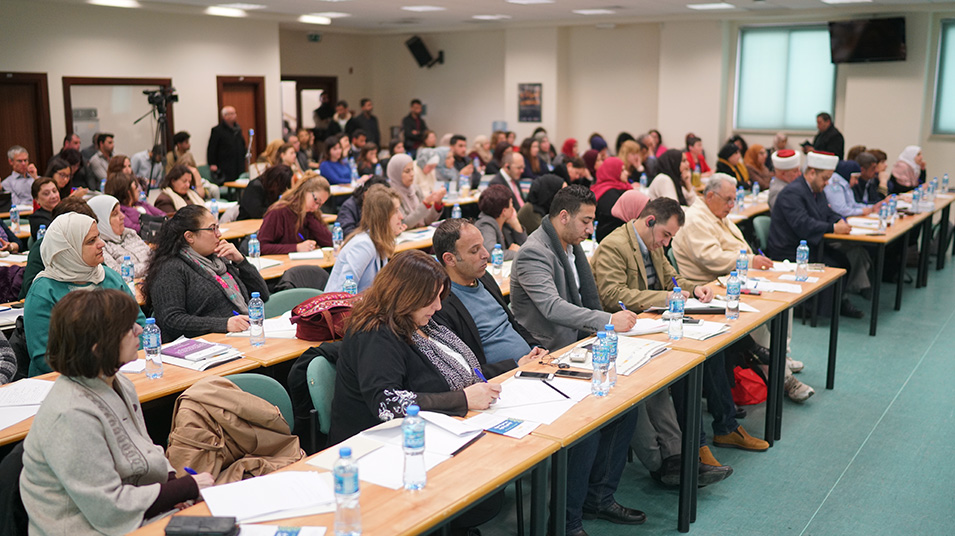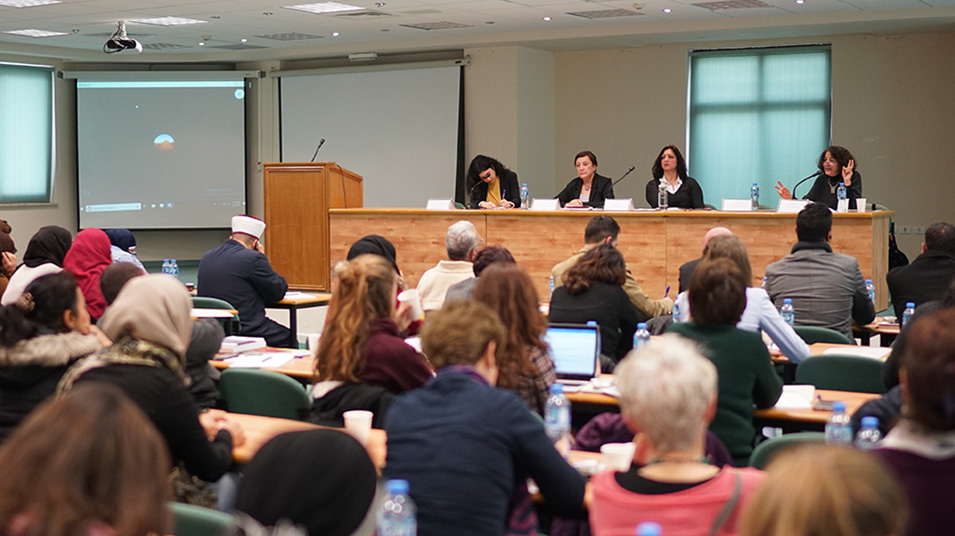The Institute of Women's Studies at Birzeit University organizes a conference titled “Gender in Palestine: Approaches to Policies and Practice”
The Institute of Women’s Studies at Birzeit University, in partnership with the Ministry of Women's Affairs and the United Nations Entity for Gender Equality and the Empowerment of Women (UN Women), organized a two-day conference titled “Gender in Palestine: Approaches to Policies and Practice,” held on March 27 and 28, 2019.
The conference discussed current policies and institutional strategies related to gender and reviewed the analytical frameworks, concepts, and methods that are adopted by governmental and nongovernmental actors and by funding institutions active in the gender and development field.
Discussions aimed to assess to what extent the policies and practices of gender and development are implemented in the Palestinian context, amidst questions whether successful implementation is possible as Palestinians struggle to achieve social justice and gender equality while remaining steadfast in their battling of Israeli violations of both human rights and signed accords.
In his welcoming remarks, Vice President for Academic Affairs at Birzeit University Henry Jaqaman, emphasized the need to “include gender dimensions in all development strategies to achieve social justice and gender equity.” He stressed the university’s belief in the importance of advocating women’s rights in Palestine, stating that “Securing justice and equity is directly linked to empowering Palestinian society as a whole as it confronts the Israeli occupation.”
Minister of Women’s Affairs Haifa Al-Agha, speaking from Gaza via video conference due to the Israeli blockade, clarified that the main goal of the conference is to analyze gender-related policies and to examine whether the implemented policies in Palestine are effective in promoting equality and social justice between men and women.
Al-Agha noted, “The conference derives its significance from the contributions of the researchers and speakers who identify the various gender actions currently implemented in Palestine, explore their effectiveness, and compare them with the experiences of other countries with similar contexts.”
The special representative of UN Women in Palestine, Ms. Maryse Guimond, outlined the agency’s programs and initiatives that aim to promote gender equity in Palestine, emphasizing the importance of cooperation among all sectors and agencies in implementing strategies and programs that can bridge gender gaps in Palestinian society.
The senior program manager of the Spanish Agency for International Development Cooperation, Mr. Jordi Lopez, emphasized the agency’s support for Palestinians and expressed his pride in recent achievements, as Palestine has adopted a more gender-sensitive approach since it ratified the Convention on the Elimination of All Forms of Discrimination against Women (CEDAW) in 2014.
Director of the Institute of Women’s Studies at Birzeit University Lena Meari payed tribute to the Palestinian political prisoners in Israeli prisons, highlighting that, “Even though Palestinian prisoners are brutally attacked by Israeli prison authorities, they are confronting these assaults with dignity.”
Meari addressed the men and women in Gaza who live under siege and continuous aggression but fight and resist with tireless determination, guided by the strong belief that they will defy the siege and that the realization of the Palestinian right to return is inevitable. She saluted Palestinian women inside Palestine “who remain steadfast in their homeland and seek to provide decent lives for themselves and their families even though they face colonial, economic, and social oppression,” and hailed the many Palestinian women in the diaspora who support their homeland.
Meari explained the objectives of the conference and outlined the themes addressed, pointing out that, “The research and studies carried out and published over the last decade by the Institute of Women’s Studies prove that the gap between men and women in Palestine is increasing both in terms of rights and socio-economic status.”
Meari pointed out that “This situation is due to both, the systematic colonial policies of the Israeli occupation authorities and the neo-liberal economic policies implemented after the signing of the Oslo Accords. These measures are weakening the social fabric and have left Palestinians in general and Palestinian women in particular more vulnerable and trapped in geographic, economic and social terms.” She highlighted that recently developed economic and social structures have negatively affected formal and informal support networks, undermined solidarity values, and fragmented communities. This situation weakens women’s voices and their agency - which tend to be overlooked among the many issues affecting Palestinian society under occupation - significantly impacting poor women in particular.
The first day of the conference comprised three sessions. Chaired by Islah Jad, the first session featured Deniz Kandiyoti, emeritus professor of development studies at the School of Oriental and African Studies, University of London, the conference’s guest speaker.
Kandiyoti tackled the broad concept of empowerment and its genealogy, setting it into international context by explaining that “Women’s empowerment has radical roots in the civil rights and feminist movements of the 1960’s and 70’s… But the concept gained global acceptance by the development industry only in the nineties.” Kandiyoti addressed the link between empowerment and patriarchy, questioning the role of patriarchy “which is frequently evoked as the root cause of women’s disempowerment.”
Kandiyoti emphasized the reciprocal relationship between gender and social equity and made it clear that “In order to tackle participation, human rights, and democracy, you need to address the questions of gender justice and equality, worldwide and in Palestine.”
Titled “Gender and Development in the Palestinian Context,” the second session was chaired by Samar Kassis and commented upon by Linda Tabar. It included papers on “The Problems of International Frameworks Affecting Gender Based Violence in Palestine,” presented by Rema Hammami; “Prospects and Obstacles to Achieving a Developmental Paradigm for Steadfastness and Liberation in the Palestinian Context,” presented by Eileen Kuttab; and “The Ongoing War against Gaza and Its Impact on Household Dynamics,” presented by Hala Al-Zibdeh from the Ministry of Women’s Affairs.
The third session, titled “Economic Dependency and Its Impact on the Formations of Gender,” was chaired by Rania Jawad and commented upon by Rula Abu Duhou; it put forth three papers. “Problems that Stem from the Dependency of the Palestinian Economy and Its Impact on Women” was presented by Samia Al-Botmeh; “Export Agriculture in the Jordan Valley (Al-Aghwar) and Its Impact on Working Women” was presented by Iman Assaf, a researcher and alumni with a master’s degree in gender and development from Birzeit University; and “Prospects and Possibilities in Resisting Economic Dependency in Informal Labour” was presented by Nidaa Abu Awwad.
The second day of the conference included three sessions. The first, titled “Strategies and Policies: An Overview and Analysis,” was chaired by Director General of Policy Unit at the Office of the Prime Minister Mahmoud Ataya and commented upon by the researcher and Director General at Women's Affairs Technical Committee Soraida Hussein. This session featured four papers, namely “The Development of Gender Plans and Policies on the Governmental Level in Palestine,” presented by Sami Sehweil from the Ministry of Women's Affairs; “The Women’s Movement and the Declaration of Women’s Rights: A Critical Review,” presented by Amal Khreisheh, an activist and the director of the Palestinian Working Woman Society for Development; “An Analysis of Gender Equality Policies and Women’s Empowerment,” presented by Basma Abu Aker, and “The Political Framework and Models Regarding Gender Policies Applied in the Palestinian Context (Gaza and West Bank),”by Islah Jad.
The second session of this day, titled “Strategies and Work Mechanisms,” chaired by Samar Kassis and commented upon by Ghada Al-Madbouh, presented four papers: “The Relevance of the Global Women’s Rights Discourse to the Reality of Palestinian Women: A Critical Reading of CEDAW and UNSCR 1325” by activist and author Rema Nazzal; “Mechanisms and Procedures Implemented by the Ministry of Women’s Affairs to Combat Violence against Women” by Ilham Sami from the Ministry of Women's Affairs; “The Work of National Committees: The Committee for the Harmonization of Legislations as a Model” by Suha Elayyan, a legal counselor and the head of the gender unit at the Palestinian Ministry of Justice; and “Legal Reforms for Gender Equality: Obstacles to Legislation Reform, a Gender Perspective” by Reem Al-Botmeh.
Chaired by Amira Silmi, this final session opened the platform for a discussion of the approaches that Palestinian women’s movements have adopted to tackle gender issues in the Palestinian context. General Union of Palestinian Women Secretary and CEDAW Coordinator Mona Al-Khalili was joined by representatives from various women’s committees and organizations, including Siham Al-Barghouthi, Khitam Saafin, Khawla Al-Azraq, Magida Al-Masri, and Randa Siniora.
Silmi opened the session by asking the speakers whether the Palestinian feminist movement is able to embrace all women and to place gender considerations as a priority on the agendas and frameworks of Palestinian organizations. She questioned to what extent funding and donations by the international community affect the way these organizations set their priorities and address gender issues in line with the Palestinian context and according to the needs of Palestinians.
In the following panel discussion, the speakers made a number of recommendations and stressed the importance of developing courses that merge the theory and practice of gender studies in Palestine.
To watch the full sessions, please visit Birzeit University’s YouTube channel.
View the first day at:
View the second day at:









